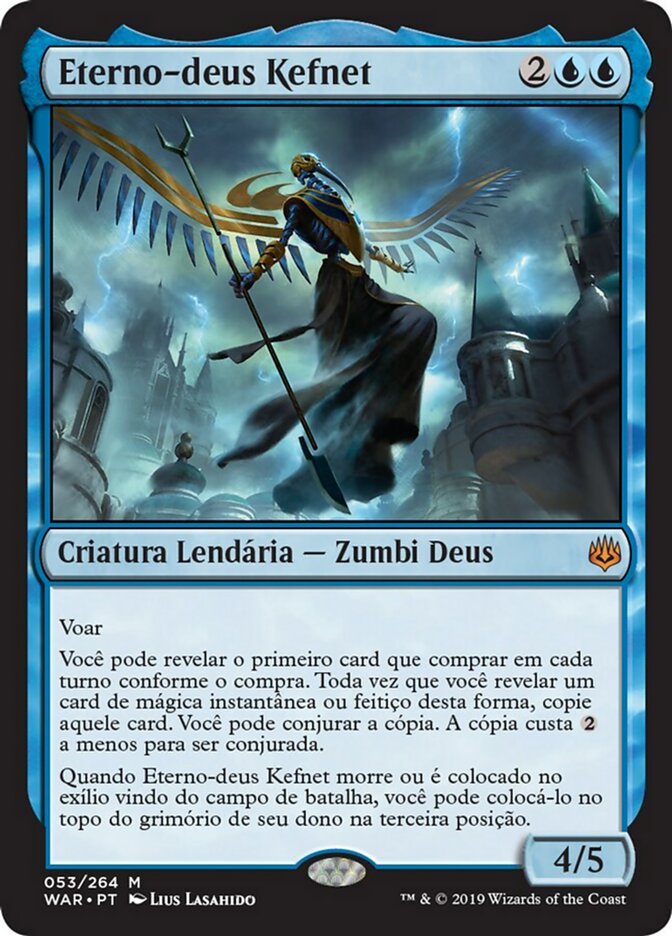
Eterno-deus Kefnet {2}{U}{U}
Criatura Lendária — Zumbi Deus
Voar
Você pode revelar o primeiro card que comprar em cada turno conforme o compra. Toda vez que você revelar um card de mágica instantânea ou feitiço desta forma, copie aquele card. Você pode conjurar a cópia. A cópia custa {2} a menos para ser conjurada.
Quando Eterno-deus Kefnet morre ou é colocado no exílio vindo do campo de batalha, você pode colocá-lo no topo do grimório de seu dono na terceira posição.
4/5
Illustrated by Lius Lasahido
- Standard
- Not Legal
- Alchemy
- Not Legal
- Pioneer
- Legal
- Explorer
- Legal
- Modern
- Legal
- Historic
- Legal
- Legacy
- Legal
- Brawl
- Legal
- Vintage
- Legal
- Timeless
- Legal
- Commander
- Legal
- Pauper
- Not Legal
- Oathbreaker
- Legal
- Penny
- Legal
Toolbox
Buy This Card
Notes and Rules Information for Eterno-deus Kefnet:
- Only the English version of a Magic card receives Oracle updates and errata. View this card in English. (Scryfall note)
- It's important to reveal the first card you draw each turn (or choose not to reveal it) before it is mixed with the other cards in your hand. You look at the card as you draw it before choosing whether to reveal it. (2019-05-03)
- You don't have to reveal a drawn card if you don't wish to copy it at that time. (2019-05-03)
- If you reveal a card this way, it remains revealed until Kefnet's triggered ability finishes resolving. (2019-05-03)
- You can reveal and copy an instant or sorcery card this way on any turn, not just your own, if it's the first card you've drawn that turn. (2019-05-03)
- Multiple card draws are always treated as a sequence of individual card draws. For example, if you haven't drawn any cards yet during a turn and cast a spell that instructs you to draw three cards, you'll draw them one at a time. Only the first card drawn this way may be revealed and copied with Kefnet's ability. (2019-05-03)
- If an effect puts a card into your hand without using the word "draw," the card wasn't drawn. (2019-05-03)
- You can cast the copy only as Kefnet's triggered ability resolves. If you don't want to cast it at that time (or you can't cast it, perhaps because there are no legal targets available), the copy ceases to exist. You can't cast it later. (2019-05-03)
- You can cast the copy during the resolution of the triggered ability if it's a sorcery, no matter whose turn it is or which phase it is. (2019-05-03)
- If the card leaves your hand before Kefnet's triggered ability resolves, you'll copy it using its last known information. (2019-05-03)
- The copy is created in and cast from your hand. (2019-05-03)
- To determine the total cost of a spell, start with the mana cost or alternative cost you're paying, add any cost increases, then apply any cost reductions (such as that of Kefnet's ability). The mana value of the spell remains unchanged, no matter what the total cost to cast it was. (2019-05-03)
- If you somehow control more than one God-Eternal Kefnet (perhaps because one is a Spark Double), you may reveal a card you draw for any number of their abilities. One at a time, each will copy the card if it's an instant or sorcery, and you may cast each of them. Each copy resolves before you cast the next, and each copy's cost is reduced by only {2}. (2019-05-03)
- If one of these Gods leaves the graveyard or exile while its last ability is on the stack, it will remain in its new zone, even if that zone is a graveyard or exile. (2019-05-03)
- If the God's owner has two or fewer cards in their library, the God is put on the bottom of their library as its last ability resolves. (2019-05-03)
- If you control another player's God when it dies, you decide whether to put that card into its owner's library. (2019-05-03)
- If an effect exiles the God and immediately returns it to the battlefield, its last ability triggers but will have no effect. However, if an effect exiles it and would return it to the battlefield at a later time, the God's ability may return that card to its owner's library first. If it does, the effect that exiled it won't return it later. (2019-05-03)
- In a multiplayer game, if you put another player's God onto the battlefield under your control, it will be exiled as you leave the game. If you were still the controller of that God, you would control its triggered ability but you have left the game; that ability won't resolve and the card remains in exile. Similarly, if you lose the game at the same time that another player's God that you put onto the battlefield is destroyed, it remains in its owner's graveyard. (2019-05-03)
- If one of these Gods dies and it's your commander, you may put it into the command zone before its ability puts it into your library. If you save your commander this way, it won't put it into your library. The same is true if it would be exiled. (2019-05-03)